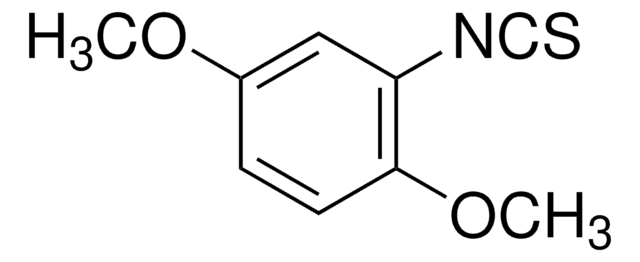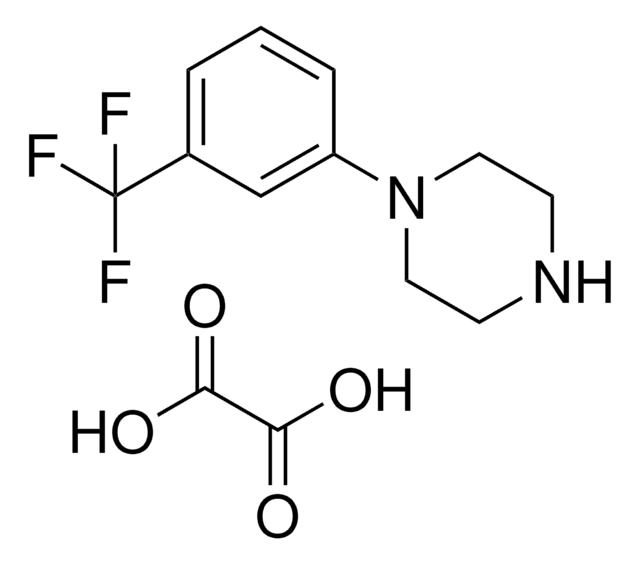SML2022
UCSF924
≥98% (HPLC)
Sinónimos:
6-Methyl-2-((3-phenoxypropylamino)methyl)quinolin-4(1H)-one, ZINC000091726127
Iniciar sesiónpara Ver la Fijación de precios por contrato y de la organización
About This Item
Fórmula empírica (notación de Hill):
C20H22N2O2
Número de CAS:
Peso molecular:
322.40
UNSPSC Code:
12352200
NACRES:
NA.77
Productos recomendados
assay
≥98% (HPLC)
form
powder
color
white to beige
solubility
DMSO: 2 mg/mL, clear
storage temp.
−20°C
SMILES string
CC1=CC=C(NC(CNCCCOC2=CC=CC=C2)=CC3=O)C3=C1
Biochem/physiol Actions
UCSF924 (Compound 9-6-24; ZINC000091726127) is a selective, high-affinity dopamine D4 receptor (DRD4) partial agonist (Ki = 3 nM for human D4) with a 7.4-fold bias toward arrestin recruitment over Gαi (Gαi/0; Gi/G0) signaling activation with respect to quinpirole. UCSF924 exhibits no detectable affinity for D2, D3 or the F261V/L328F D4 mutant and no agonist activity toward a panel of 320 nonolfactory GPCRs even at a high concentration of 1 μM. The UCSF924 structure analog UCSF924NC (Comound 9-6-16; ZINC000091707446) is the recommended negative control compound with a 1/2500-fold reduced D4 affinity.
Storage Class
11 - Combustible Solids
wgk_germany
WGK 3
flash_point_f
Not applicable
flash_point_c
Not applicable
Certificados de análisis (COA)
Busque Certificados de análisis (COA) introduciendo el número de lote del producto. Los números de lote se encuentran en la etiqueta del producto después de las palabras «Lot» o «Batch»
¿Ya tiene este producto?
Encuentre la documentación para los productos que ha comprado recientemente en la Biblioteca de documentos.
Inger Lauritzen et al.
Acta neuropathologica, 132(2), 257-276 (2016-05-04)
Endosomal-autophagic-lysosomal (EAL) dysfunction is an early and prominent neuropathological feature of Alzheimers's disease, yet the exact molecular mechanisms contributing to this pathology remain undefined. By combined biochemical, immunohistochemical and ultrastructural approaches, we demonstrate a link between EAL pathology and the
Sheng Wang et al.
Science (New York, N.Y.), 358(6361), 381-386 (2017-10-21)
Dopamine receptors are implicated in the pathogenesis and treatment of nearly every neuropsychiatric disorder. Although thousands of drugs interact with these receptors, our molecular understanding of dopaminergic drug selectivity and design remains clouded. To illuminate dopamine receptor structure, function, and
Fiorenza Stagni et al.
Neurobiology of disease, 103, 11-23 (2017-04-01)
Neurogenesis impairment is considered a major determinant of the intellectual disability that characterizes Down syndrome (DS), a genetic condition caused by triplication of chromosome 21. Previous evidence obtained in the Ts65Dn mouse model of DS showed that the triplicated gene
Gary Probst et al.
Journal of medicinal chemistry, 56(13), 5261-5274 (2013-05-30)
Herein, we describe our strategy to design metabolically stable γ-secretase inhibitors which are selective for inhibition of Aβ generation over Notch. We highlight our synthetic strategy to incorporate diversity and chirality. Compounds 30 (ELND006) and 34 (ELND007) both entered human
Inger Lauritzen et al.
The Journal of neuroscience : the official journal of the Society for Neuroscience, 32(46), 16243-1655a-16243-1655a (2012-11-16)
Triple-transgenic mice (3xTgAD) overexpressing Swedish-mutated β-amyloid precursor protein (βAPP(swe)), P310L-Tau (Tau(P301L)), and physiological levels of M146V-presenilin-1 (PS1(M146V)) display extracellular amyloid-β peptides (Aβ) deposits and Tau tangles. More disputed is the observation that these mice accumulate intraneuronal Aβ that has been
Nuestro equipo de científicos tiene experiencia en todas las áreas de investigación: Ciencias de la vida, Ciencia de los materiales, Síntesis química, Cromatografía, Analítica y muchas otras.
Póngase en contacto con el Servicio técnico








